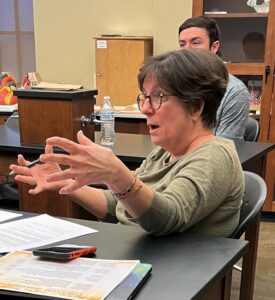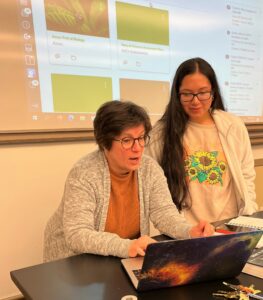GREENEVILLE – An associate professor of biology at Tusculum University has earned a fellowship for a post-doctoral research project that will study the yellow marsh marigold, an at-risk flower species.

Dr. Susan Monteleone, foreground, speaks during the Natural Sciences Department’s senior seminar in 2022.
Dr. Susan Monteleone, who serves as the lead environmental science faculty member, received the fellowship from the Appalachian College Association. Her work will take place in the spring and summer and will be focused in a tributary in Greene County.
“We live, work and play in one of the most environmentally rich regions of the country, and it is vital that we take all possible measures to protect and preserve the natural treasures we are blessed to enjoy,” Dr. Monteleone said. “I am grateful to the Appalachian College Association and the university for supporting this research of an important species with the goal of sustaining the yellow marsh marigold and enabling it to flourish moving forward.”
Dr. Monteleone said this version of the marigold is a widespread native perennial in the Ranunculus family. It blooms from mid-April to June, with its seeds becoming available in the summer.
The yellow marsh marigold is a critically imperiled rhizomatous herbaceous species in its southern range. This species has been found in Carter, Greene and Johnson counties in Northeast Tennessee. Dr. Monteleone said a small amount of the plant was transplanted to the Greene County tributary, which is also a wetland habitat. Two transplantation events resulted in 20% surviving after the second year.
Dr. Monteleone said recent studies of this plant have been limited and concentrated on its medicinal properties. Her research will examine physical and biological conditions that influence the yellow marsh marigold’s reproduction and potentially impact its endangered status, key pollinator associations, seed production and dispersal as well as growth.

Dr. Susan Monteleone, left, works with student Mirna Jacinto Ramirez in 2023.
Dr. Monteleone has served on the Tusculum faculty since 2017. Her prior research includes ecological studies in Marshall Forest in Rome, Georgia, one of the few remaining urban old growth forests in the United States. She was awarded a grant in 2016 from Beta Beta Beta, a national biology honor society, to fund and encourage student participation in undergraduate research.
As a Tusculum faculty member, she has engaged her students in research activities that result in presentations at the university’s Academic Symposium and the Natural Sciences Department’s senior seminar. Her students receive active and experiential learning at the university’s Paul E. Hayden Educational Wetland and in Tusculum’s Level 1 arboretum. She was instrumental in establishing the Kappa Delta Eta chapter of Beta Beta Beta at Tusculum in 2022.
Dr. Monteleone has been featured in a variety of publications and has presented at numerous professional conferences.
Dr. Heather Henson-Ramsey, dean of Tusculum’s College of Science, Technology and Mathematics, is pleased Dr. Monteleone is pursuing additional professional development. She said this fellowship will enhance Dr. Monteleone’s teaching.
“We are extremely proud of Dr. Monteleone, who is a valuable member of our environmental science program,” Dr. Henson-Ramsey said. “Research is a key component of the student experience at Tusculum, and Dr. Monteleone expertly guides our Pioneers to develop their skills in this practice. Her mentoring equips them to be career-ready professionals and pursue further academic studies. Seeing her participate in more research of her own reinforces the value of such work, inspires our students and demonstrates the university’s commitment to civic engagement.”
Supplementary information about Tusculum’s environmental science program is available at https://site.tusculum.edu/environmental-science/. To learn more about the university, please visit www.tusculum.edu.


